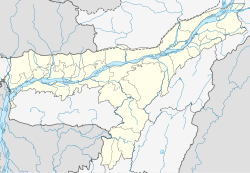Margherita, Assam
| Margherita | |
|---|---|
| Town | |
| Location in Assam, India | |
| Coordinates: 27°17′N 95°41′E / 27.28°N 95.68°ECoordinates: 27°17′N 95°41′E / 27.28°N 95.68°E | |
| Country |
|
| State | Assam |
| District | Tinsukia |
| Government | |
| • Body | Margherita Town Committee |
| Elevation | 162 m (531 ft) |
| Population (2001) | |
| • Total | 26,914 |
| Languages | |
| • Official | Assamese |
| Time zone | IST (UTC+5:30) |
| PIN | 786181 |
| Telephone code | 91 - (0) 3751 - XX XXXX |
| ISO 3166 code | IN-AS |
| Vehicle registration | AS-23 |
Margherita (IPA: ˌmɑːgəˈrɪtə) is a census town in Tinsukia district in the Indian state of Assam. The small sub-divisional town has scenic beauty though nothing like a tourism business. The town is surrounded by hills, tea gardens, forest and the Dihing River. It has a beautiful golf course at the foot of the hills and a small stream running through. The lack of tourism is mostly due to terrorist activities in the neighboring remote locations. The United Liberation Front of Asom (ULFA) has been active in the area over past decades. The name Margherita actually derives from the Italian queen and dates back to the late 19th century as a token appreciation for the Italian Chief Engineer of a rail section Chevalier R Paginini who supervised the construction. Margherita was famous for its collieries much developed by the British. Coal India Ltd is the biggest industry here. Apart from this are Kitply and other small plywood industries and tea gardens. Tata Tea has factories in the locality.
Margherita is located at 27°17′N 95°41′E / 27.28°N 95.68°E. It has an average elevation of 162 metres (531 feet). The Dihing River flows through Margherita. The Patkai Hills are visible from the town.
As of 2001[update] India census, Margherita had a population of 23,836. Males constitute 52% of the population and females 48%. Margherita has an average literacy rate of 76%, higher than the national average of 59.5%: male literacy is 81%, and female literacy is 71%. In Margherita, 11% of the population is under 6 years of age. The main communities of the area includes Ahoms, Sutiya, Moran, Nepali, Bihari, Singpho, Muttock etc.
...
Wikipedia


